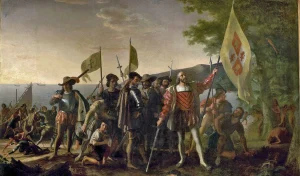
Christopher Columbus’s discovery of the New World on October 12, 1492 marked a major turning point in history, opening the Americas to European exploration and colonization. Sponsored by Spain, Columbus set sail across the Atlantic hoping to find a faster route to Asia for trade and wealth. Instead, he landed in the Caribbean on islands such as Hispaniola, which began a lasting connection between Europe and the Americas. He believed he had actually arrived in India, the place he was set for. Today we know this is not true, for he was off by thousands of miles.
His voyage introduced new goods, animals, and ideas to both sides of the world, leading to what became known as the Columbian Exchange. Plants like corn and potatoes were brought back to Europe from the New World, horses and cows were brought to the Americas, in addition to many other goods. However, this contact also brought tragedy. European diseases like smallpox spread quickly, killing millions of Indigenous people who had no immunity. The arrival of explorers and settlers also led to the loss of native lands, forced labor, and the destruction of many cultures. The idea of Darwinism made Europeans believe that they were superior to the native people of the Americas, causing these various gruesome events to happen.
Even though Columbus is often praised for his courage and navigational skills, many people today question whether he should be celebrated at all. Regardless, his journey helped shape the modern world, but it also marked the beginning of centuries of suffering for Indigenous peoples. The story of Columbus reminds us that history is complicated, for while exploration ultimately led to growth and discovery, it also came with deep human costs that continue to be discussed and remembered today.
Painting by John Vanderlyn, 1847

